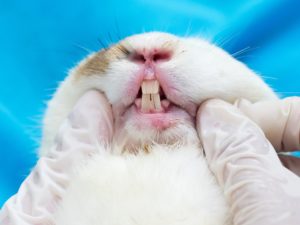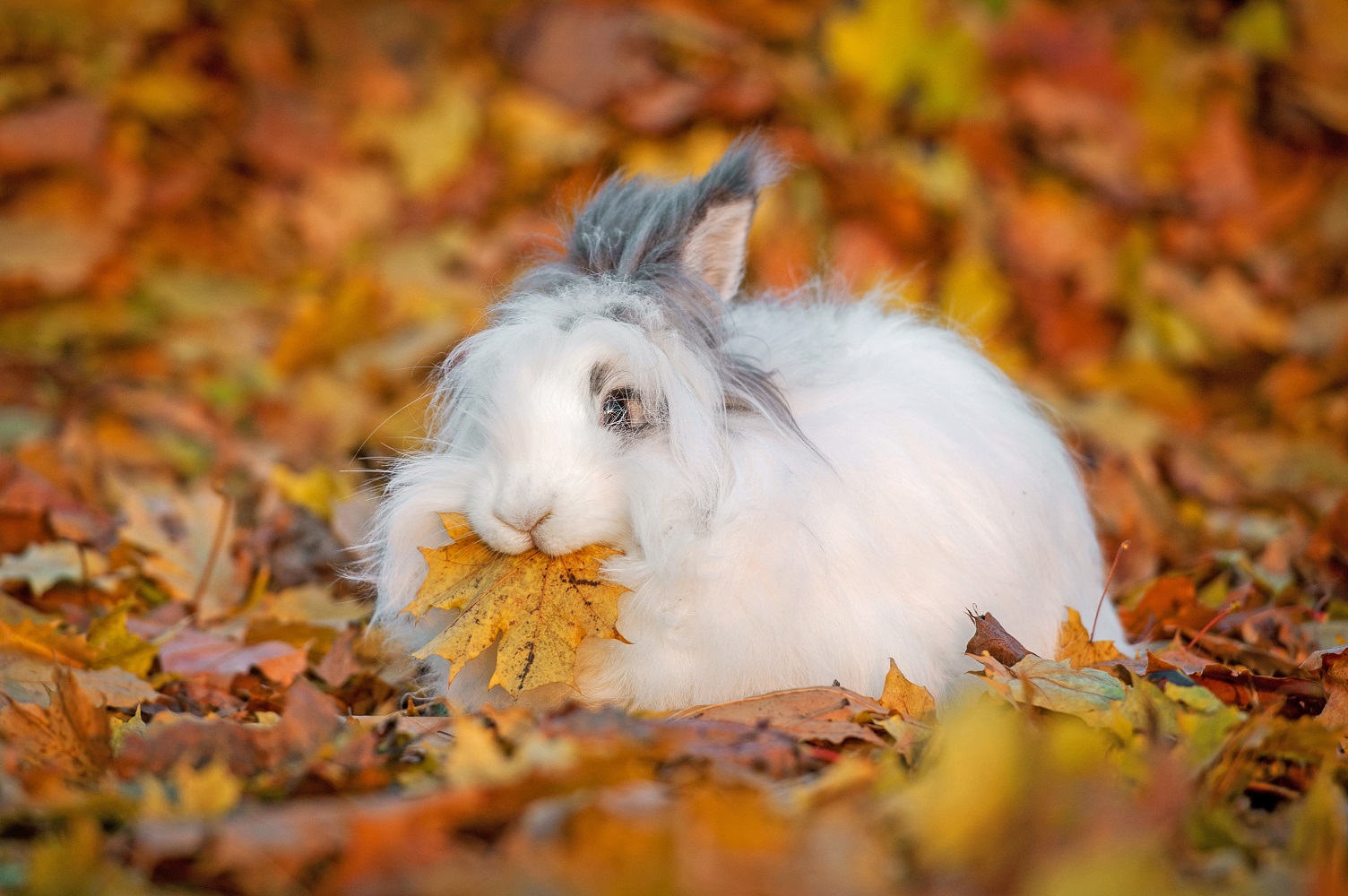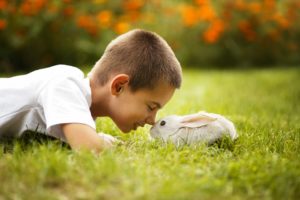Under the proper care and attention, pet rabbits can make excellent fuzzy companions. But even under the best care possible, there is always the risk of your furry friend becoming ill. If you suspect your rabbit might not be feeling well, it is recommended that you contact your veterinarian as soon as possible.
There are a few common ailments that can affect rabbits that all rabbit owners should keep in the back of their mind. Rabbits are prey animals, which means they are easily stressed and very good at hiding their pain. It is responsible pet ownership to become familiarized with the common diseases that can affect pet rabbits.
Dental Disease
Rabbits have different teeth than we do! Rabbits have evolved to consume large quantities of roughage, including grass and hay. As a result, rabbit’s have continuously growing teeth that are worn down by chewing their rough diet. If rabbits are not consuming enough roughage in their diet, this can lead to overgrowth and misalignment of their teeth. This overgrowth and misalignment can lead to sharp points to develop, which can traumatize the rabbit’s lips and cheeks. These wounds inside the rabbit’s mouth can become infected and become abscesses, which require medical attention from your veterinarian.
 Some rabbits may be predisposed to developing dental disease, just like some people are more prone to developing cavities and needing to see their dentist more often! It is important to feed your rabbit a proper diet, and to monitor your rabbit for any signs of dental disease including inappetence, drooling, weight loss, facial swelling, and discharge from eyes and/or nose.
Some rabbits may be predisposed to developing dental disease, just like some people are more prone to developing cavities and needing to see their dentist more often! It is important to feed your rabbit a proper diet, and to monitor your rabbit for any signs of dental disease including inappetence, drooling, weight loss, facial swelling, and discharge from eyes and/or nose.
Gastrointestinal Tract Issues
Typically the most commonly encountered ailments of pet rabbits are conditions related to their gastrointestinal system (stomach and intestinal tract). There are various gastrointestinal (GI) problems that can occur in rabbits, including obstruction, bloat, and stasis. Rabbits have very sensitive GI tracts and are not capable of vomiting. Rabbits can develop GI disease due to stress, improper diet, consuming hair or a foreign object, or even due to concurrent disease in another body system.
GI issues in rabbits are very serious and can be fatal. Time is of the essence. If you notice your rabbit is not eating as much, not eating at all, is behaving abnormally, has reduced or no defecations, is sitting in a hunched position, or seems reluctant to move, bring them into your veterinarian immediately.
Snuffles
The name “snuffles” might sound adorable, but the medical terminology “sinusitis” and “rhinitis” are not so cute! Rabbits are susceptible to bacterial infection of their respiratory tracts, frequently causing nasal discharge, congestion, and sneezing. It can sometimes be challenging to identify respiratory infection due to the subtlety of clinical signs. Rabbits are typically very cleanly creatures; grooming themselves often enough that discharge may be overlooked by even the most vigilant owners. Sometimes there may be matting of fur on the rabbit’s front limbs and paws due to grooming of the nasal and/or ocular discharge.
Antibiotics are sometimes sufficient to treat mild respiratory infection in rabbits, however care must be taken to select an appropriate antibiotic and treatment timeline so not to disturb the rabbit’s sensitive and vital gastrointestinal system. It is very important to properly follow your veterinarian’s guidelines for treatment. Severe or chronic respiratory infections in rabbits may require more aggressive treatment, and further diagnostics to identify a possible underlying cause for the infection. Important rule-outs for respiratory-like clinical signs in rabbits are nasal foreign object, dental disease, heart disease, and even cancer.
Spinal Injury
Although perhaps not nearly as common as dental, gastrointestinal, or respiratory illness, spinal injury deserved a place on this post due to the unique nature of this injury. Rabbit’s hind limbs are extremely powerful, allowing them a quick getaway from their many potential predators. Unfortunately, those powerful limbs can sometimes be to their own detriment. Rabbits are capable of kicking their hind limbs hard enough to cause fractures to their spinal vertebrae and even severe injury to their spinal cord. Improperly handing, startling, or dropping a rabbit are the most common causes of the spinal trauma. Other pets such as dogs can sometimes lead to starting a rabbit enough for them to cause injury to themselves. It is very important to learn how to properly handle your rabbit and keep them in a calm, safe environment.
If you notice your rabbit has hind-end paralysis where they seem unable to move or use their hind limbs, bring them into your veterinarian immediately. They require immediate veterinary attention because the inability to use their hind end is extremely distressing for rabbits, and they will be unable to properly eat and care for themselves. There are other less likely possible causes of hind limb paralysis in rabbits aside from trauma that can occur, so your veterinarian will need to assess your rabbit directly to determine the likely cause of the paralysis, the severity of the paralysis, and therefore appropriate action going forward.
Uterine Cancer
If your female rabbit has not been spayed (had her reproductive tract removed), then she is highly susceptible to developing uterine cancer, most commonly uterine adenocarcinoma. As discussed in the previous blog post on rabbit care, 60% of rabbits over three years of age develop uterine cancer, with some breeds reaching as high as 80% of female rabbits developing uterine cancer. Uterine cancer in rabbits is very malignant, meaning it has a high tendency to spread around the body, particularly to the abdomen and lungs.
The most classical clinical signs seen with uterine cancer in rabbits is blood coming from your rabbit’s uterus, often appearing in the litterbox or in the urine in general, as well as vaginal discharge. Many rabbits with uterine cancer also develop cysts or tumours in their mammary glands.
You may wonder why female rabbits are so prone to developing uterine cancer. Female rabbits have developed to become extremely reproductively fertile, with rapidly fluctuating hormone levels resulting in a constant variation in the cells lining her uterine wall. This continuous flux of the uterine wall increases the chances of the development of abnormal or cancerous cells. Choosing to either breed or to not breed your rabbit does not alter the chances of her developing uterine cancer. The best method to preventing uterine cancer in rabbits is to have your female rabbit spayed when she reaches 6 months of age.
Thank you for reading this post and taking an important step in learning about rabbit health and wellness! Please don’t hesitate to call the clinic if you have any concerns or questions about your rabbit’s health.



